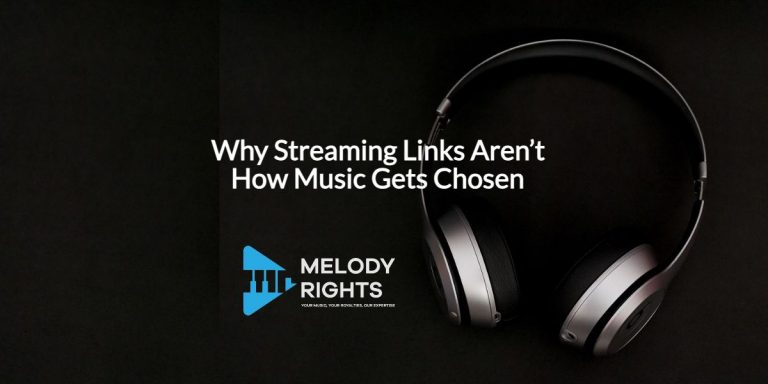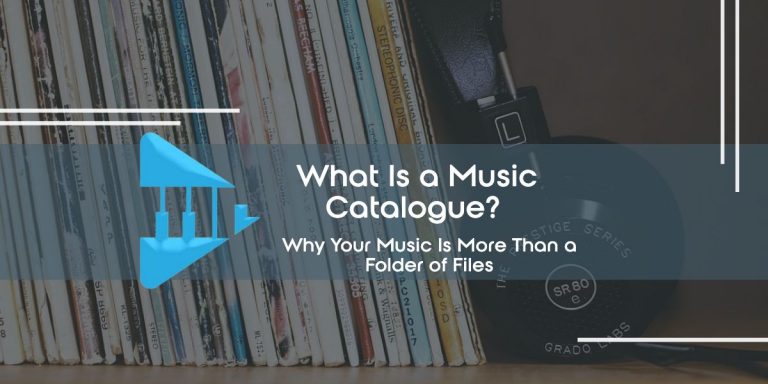TL;DR: What Are Music Publishers?
Music publishers help songwriters and producers get paid. They register your songs, track royalties, and pitch for sync placements in film, TV, ads, and games.
Table of Contents
ToggleIf you’re an indie artist, a publisher makes sure your rights are protected and your income doesn’t slip through the cracks. The right publishing setup means more money in your pocket and less time buried in admin work.
A Day in the Life of an Indie Artist
You’re scrolling over breakfast. Spotify shows $4.28 for last month, barely enough for coffee.
Then you spot it. Another indie from your city landed a TV placement. Same late nights, same grind, but their track’s getting heard while you’re still waiting for your shot.
Quick Answer: What Does a Music Publisher Do?
Picture this: You upload a new track and figure the toughest part is behind you.
Months later, you check your statements and see some royalties are still sitting in limbo. All because a tiny detail didn’t line up in the right database.
That’s frustrating, and honestly, it happens to more artists than you’d think.
This is where a music publisher comes in. They clean up the mess so your money actually reaches you.
What Does a Music Publisher Do for an Artist?
A publisher protects your songwriting rights, keeps track of every cent you’re owed, and works to get your music placed in film, TV, ads, and games. You handle the creative. They focus on the business and the paperwork.
Why Do Indie Artists Need This?
Indie artists juggle production, promotion, and booking. Admin gets buried. And that’s how royalties get lost.
Every year, millions in royalties never reach artists simply because registrations or metadata weren’t set up correctly. Real money disappears into the system.
Global publishing royalties hit a record €13.1 billion in 2023, up 7.6% year-on-year, yet a significant portion remains unclaimed, often due to missing data and improper registrations (CISAC Global Collections Report 2024).
Why Is Sync Licensing So Important?
Sync means getting your music into a show, film, commercial, or game.
It’s one of the fastest ways for indie artists to earn real income. In some regions, sync already makes up over 20 percent of all publishing revenue.
One good placement can pay more than months of streaming. (AMW Group)
Quick Wins for Indie Musicians
- Register every song with your PRO as soon as it’s finished. How to Register My Music
- Double-check your ISRCs and splits before you upload.
- Try sending one track for sync every quarter.
- Not sure what an EP is or how it fits? Here’s the answer: What Does EP Stand For In Music
It’s easy to think the missing money is always some big payout. The truth is, most of what slips through are those steady little payments that add up. A good publisher makes sure those pieces find their way home.
Why the Current Music Publishing System Fails Indie Artists

You didn’t make music to fill out forms. But if you’re handling everything yourself, admin work.
Publishing was built for labels, not bedroom producers. Miss one split or code, and the money never shows. It happens more than you think.
Common ways indie artists miss out on royalties:
- Forgetting to add a co-writer or split percentage
- Uploading a track with missing or wrong ISRC codes
- Waiting until after release to register with a PRO
- Not keeping your info current with your collection society
There’s always something more urgent: recording, gigs, keeping up on social media, selling merch. Admin and metadata slip down the list. That’s how you end up missing income that should have been yours.
A lot of independent artists only realize it’s a problem when the payout never arrives. The royalties get stuck in the system and never make it home. For indies, this isn’t just a financial loss. It’s time, creative energy, and momentum that could have fueled your next release.
Every missed step adds up. For a clear guide on fixing the basics, check out How to Register My Music.
What a Music Publisher Actually Does (and Why It Matters)
Your song is a passport. Every time it’s played, whether it’s on a friend’s playlist, at a local bar, or in a student film, you deserve credit.
A good publisher is your fixer. They help your music get the recognition and income it’s earned.
The Core Jobs of a Music Publisher
Register your songs
Your publisher makes sure every track is tagged with the right info. This is what gets you paid.
Collect your royalties
There’s more than one kind of royalty. A publisher keeps tabs on all of them: performance, mechanical, and sync. That way, nothing slips through the cracks.
Pitch and place your music
Publishers don’t just hope your song gets picked up. They actively pitch it for shows, ads, and games where sync fees can boost your income.
Handle the admin
You get to stay creative. They handle contracts, licensing, and the details, even for uses you might never hear about.
Deal types, in plain English
- Admin deal: You keep your rights. They do the paperwork for a fee.
- Full publishing: They pitch and manage admin, but take a cut.
- Co-pub: You split both rights and pitching with them.

Myth vs Reality: Who Really Gets You Paid?
Myth: You need a record label to earn serious money from your songs.
Reality: Most publishing income comes from performance, mechanical, and sync royalties. It has nothing to do with labels. Independent artists can collect the same royalties if their songs are properly registered and pitched.
Myth: A record label will collect all your royalties.
Reality: Most sync and performance income comes from publishing administration, not from label deals. Labels focus on recordings, not songwriting rights. Publishing royalties are separate from master royalties, which are paid for the recording itself. Both matter, but they’re collected in different ways.
Quick Tip: Check your royalty statements. If you only see master royalties, you’re missing publishing income.
Common indie artist moment:
A lot of musicians don’t even realize there are different kinds of royalties until the first time they see a payment missing. Nobody really explains this stuff until you work with a publisher or dig deep into the details yourself.
Publisher vs Label: What You Need to Know
| Role | Publisher (Admin Deal) | Co‑Publishing Deal | Record Label |
| Rights control | You retain full songwriting rights | You keep writer’s share, share publisher’s share | Label owns master rights |
| Admin service | Yes, covers all registrations | Yes, plus pitching & promo | Limited to recordings |
| Sync pitching | Sometimes included | Often included | Rare or secondary |
| Royalty percentage | 80-90 % of publishing share | Around 75% of publishing share (50% writer’s share + 25% publisher’s share) | Varies by contract |
Source: ONErpm Blog: Understanding Publishing Deals
How to Take Control of Your Music Publishing: Step-by-Step for Indie Artists
Publishing isn’t a guessing game. Here’s how to get paid, even if you’re just starting out.
1. Register Every Song Early (Music Publishing 101)
Don’t wait for a track to take off. As soon as you finish a song, register it with your Performing Rights Organization (PRO). This puts your rights on record and lets royalties find their way to you.
Want a full walk-through? See How to Register My Music.
2. Nail Your Metadata for Royalties
Before uploading anywhere, double-check your ISRC codes, song titles, and every writer’s split. If you’re missing details, you’re missing money. This is where most lost royalties happen.
3. Distribute for Sync Licensing, Not Just Streaming
Don’t only focus on Spotify. Make sure your music is ready for placements in TV, film, ads, and games. Have your files and info organized so you can jump at every opportunity. If you want to pitch your music for sync, check out this guide on submitting music for film and TV.
4. Audit Your Song Catalog Each Quarter
Every few months, check your songs, codes, and splits. Are there gaps? Is everything registered? Fix issues now so you don’t lose money later.
5. Pick a Publishing Platform That Works for Indie Musicians
Find a partner or platform that tracks every royalty, lets you keep control, and can pitch your music for placements. You don’t have to lock into an old-school publishing deal. Flexibility is key.

Common Music Publishing Mistakes to Avoid
- Registering songs with your PRO after release instead of before
- Skipping split sheets, especially if you’re collaborating with friends
- Using different song titles or spellings across platforms
- Forgetting to update your contact or banking info
Pro tip: Take half an hour each quarter to check all your registrations and splits. It’s a small habit that can save you a lot of money and stress down the road.
How Melody Rights Makes Music Publishing Work for Indie Artists
If reading these steps feels overwhelming, you’re not alone. Managing registrations, metadata, and pitching for sync can feel like a second job. Even established artists lose payments or placements because something small slipped through.
Melody Rights was built to solve that headache. It’s sync-first, non-exclusive, transparent, and puts you in control from the start.
Sync Placements from Day One
Your music is prepped and delivered for sync right out of the gate. That means TV, film, ads, games, and stock libraries. It’s not limited to streaming platforms. You don’t need to chase down third parties or figure out complicated submission portals.
You Keep Your Rights and Your Options
With Melody Rights, you stay independent. You decide where your tracks go, and you can keep using whatever distributor you like. Nothing gets locked away and you keep ownership at every step.
All Your Royalties in One Dashboard
Track your earnings and sync activity in real time. No waiting months for a statement. No mystery payments. Just clear, simple reporting and global registration, all in one place.
Admin Without the Busywork
Melody Rights takes care of PRO registrations, ISRCs, metadata, and splits. You don’t need to chase paperwork or worry about missing info. The boring stuff is handled, so your work gets tracked everywhere.
Real Income, Not Just Exposure
Sync placements and other payouts go directly to you. There are no hidden cuts or surprise fees. You see exactly what you earn and where it’s coming from.
Made for the Indie Artist
Start free, pay per track, or go unlimited when you’re ready to scale.
If you’re ready to pitch your music for film or TV, check out this guide to submitting your music for sync.
A Day in the Life with Melody Rights
You log in, coffee in hand. The dashboard shows your latest sync placement and what’s been paid. No guesswork, no searching for emails or spreadsheets. You see your music’s progress in real time and get back to creating.
You don’t have to figure this out alone or hand over your independence. Melody Rights is a co-pilot, not a gatekeeper, giving you real backup so your music and your money don’t get lost.
A Real-World Indie Scenario
Picture a solo indie producer. She writes, records, uploads, and promotes her music herself. It’s a lot to keep track of, and publishing always felt confusing.
One day, a friend uses her track in a short film. She waits for the royalty, but nothing comes in. Turns out, the registration wasn’t done and her split info was missing. The money never found her.
She finally tries a platform that handles registrations and tracks every income stream. The next time her song is used in a web ad, the payment shows up. No chasing required.
Most artists only realize what they’re missing when a payment never comes. Melody Rights fixes that, tracking your royalties and keeping you focused on creating.
Take Control of Your Music Publishing
You put in the work. Your music deserves to get heard and paid.
If you’re tired of chasing missing payments or feeling lost in the paperwork, it’s time to simplify.
Melody Rights gives you the tools to register, track, and pitch your music without losing your independence or your voice.
Start by getting your next track registered, or explore how Melody Rights can back up your music.
You decide where your music goes, and who profits from it.
Focus on your craft. Let the right publishing setup do the heavy lifting.
Frequently Asked Questions
What does a music publisher do for indie artists?
A music publisher helps you register your songs with PROs, ISRCs, and correct splits. They collect mechanical and performance royalties and pitch your music for sync in TV, ads, games, and film. It’s about making sure every note you write earns you money, even beyond streaming.
How do I register my song to collect royalties?
To get paid, start by registering your track with a Performing Rights Organization (like ASCAP, BMI, PRS) and get an ISRC code. Double-check your metadata and writer splits before upload. For a step-by-step guide, see How to Register My Music.
Can I get sync placements without a music publisher?
Yes, but it’s much easier with one. Sync placements require the right metadata, permissions, and admin setup. If you want to pitch your music for TV or film, check out Submit Music for Film and TV to see how Melody Rights makes it happen.
What’s the difference between publishing and master royalties?
Publishing royalties are tied to your songwriting, including mechanical and performance payments. Master royalties come from the actual recording and are handled by your distributor or record label. Melody Rights tracks both publishing and master royalties in one clear dashboard.
Read more about that here: Master Royalties vs. Publishing: What They Are — and How to Own Both
Do I need a record label if I use Melody Rights?
No. Melody Rights works alongside any distributor you choose, like DistroKid, TuneCore, or Bandcamp. You stay in control, keep your rights, and still get sync-ready setup and royalty tracking.



